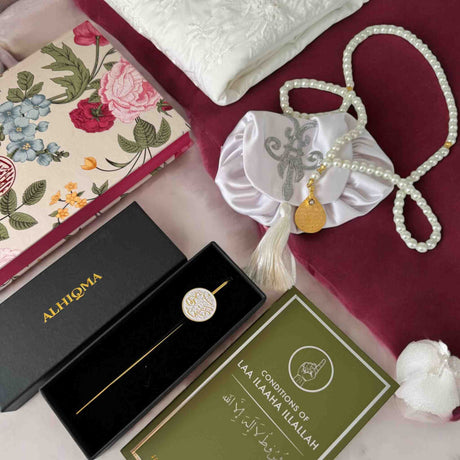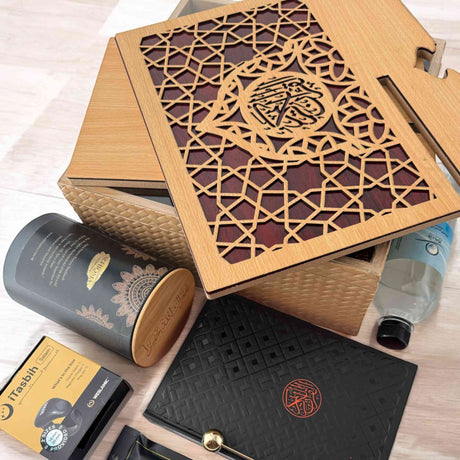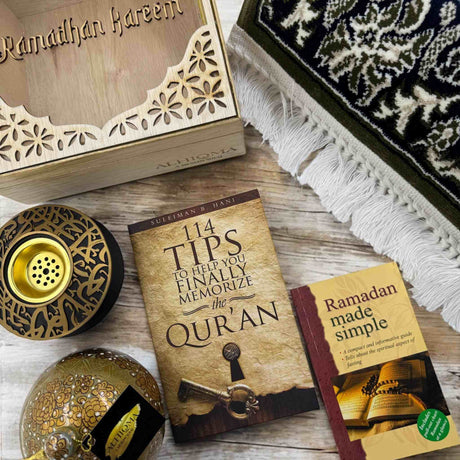Key Takeaways
- Divine Promise: The first 10 days of Zulhijjah offer rewards more beloved to Allah than any other days, as confirmed in authentic hadith from Sahih al-Bukhari.
- Accessible Forgiveness: Fasting on the Day of Arafah can erase sins from the previous and coming year, providing a clean slate for both pilgrims and non-pilgrims alike.
- Practical Integration: AlHiqma's experience serving Singapore's Muslim community shows that simple tools like digital tasbihs and tagged Qurans help busy families maximize these sacred days meaningfully.
A Month Like No Other
Have you ever wondered which days of the year Allah ﷻ treasures most? As the blessed month of Zulhijjah approaches, hearts around the world turn toward these unmatched opportunities for spiritual elevation and divine connection.
In our seven years serving Singapore's Muslim community at AlHiqma, we've witnessed families transform their approach to these sacred days. From working mothers struggling to balance spiritual aspirations with daily responsibilities, to young professionals seeking authentic ways to honor Islamic traditions while navigating modern life – Zulhijjah offers something profound for everyone.
Whether you're performing Hajj or following these blessed days from home, the first ten days of Zulhijjah represent divine gifts that transcend geographical boundaries and personal circumstances.
The Virtue of the First Ten Days
Why These Days Hold Unmatched Status
The Prophet ﷺ proclaimed with absolute clarity: "There are no days on which righteous deeds are more beloved to Allah than these ten days" (Sahih al-Bukhari). This divine preference extends beyond even the blessed nights of Ramadan, making Zulhijjah truly exceptional in the Islamic calendar.
Islamic scholars explain that these days combine the opportunity for multiple forms of worship – fasting, prayer, charity, dhikr, and pilgrimage – creating a spiritual convergence that multiplies rewards exponentially.
Maximizing Every Moment
Through our interactions with Singapore's Muslim families, we've learned that success lies in realistic, sustainable practices. Consider incorporating dhikr during your morning commute, or reading Quranic passages about sacrifice and gratitude with your children during family time.
Small, consistent actions during these ten days often yield greater spiritual benefits than overwhelming ourselves with unsustainable practices.
Fasting on the Day of Arafah: Two Years of Forgiveness
The Promise of Complete Cleansing
For Muslims not performing Hajj, the 9th of Zulhijjah (Day of Arafah) offers extraordinary mercy. The Prophet ﷺ assured us: "It expiates the sins of the previous year and the coming year" (Sahih Muslim).
This represents one of Islam's most generous offerings – complete spiritual renewal through a single day's devotion. The mathematical beauty is striking: 24 hours of fasting exchanged for 730 days of forgiven sins.
Making Arafah Accessible for Busy Lives
Based on feedback from our customers, successful Arafah fasting requires preparation. We recommend preparing simple iftar meals the evening before, setting prayer reminders to maintain spiritual focus, and incorporating gentle dhikr throughout the day rather than attempting intensive worship that might overwhelm your schedule.
The Power of Takbeer and Dhikr
Filling Your Home with Sacred Sound
From the first day of Zulhijjah through the 13th, the takbeer creates a spiritual atmosphere that transforms ordinary spaces into places of remembrance: "Allahu Akbar, Allahu Akbar, La ilaha illa Allah, wa Allahu Akbar, Allahu Akbar, wa lillahil hamd."
This practice connects your family directly to millions of Muslims worldwide, creating unity across continents and cultures. The takbeer serves as both individual worship and community building.
Creating Family Traditions
Our experience shows that involving children in takbeer creates lasting spiritual memories. Consider establishing a daily family takbeer time, decorating a special corner with beautiful prayer items, or using tasbih counters to track family dhikr goals together.
Sacrifice (Qurban) – Embodying Ibrahim's Legacy
Beyond the Physical Act
The Quran teaches us that "Their meat will not reach Allah, nor will their blood, but what reaches Him is piety from you" (Surah Al-Hajj 22:37). Qurban represents submission, gratitude, and community care rather than mere ritual compliance.
Prophet Ibrahim's willingness to sacrifice his most beloved possession – his son – demonstrates the ultimate trust in Allah's wisdom. Our participation in Qurban connects us directly to this profound legacy of faith.
Making Qurban Meaningful for Southeast Asian Families
Many of our customers share Qurban meat with neighbors from different communities, creating bridges of understanding and demonstrating Islam's emphasis on social responsibility. Consider involving your children in selecting recipients, explaining the spiritual significance, and expressing gratitude for Allah's provisions.
Hajj: Honoring the Pilgrimage from Afar
Supporting the Ummah's Journey
Even if we're not physically in Mecca, these days connect us spiritually to millions of pilgrims. Our prayers, supplications, and good deeds join theirs in creating a global wave of worship that spans time zones and borders.
Consider gifting a travel-sized Quran to someone you know performing Hajj, making specific duas for pilgrims during your daily prayers, or using this time to solidify your own Hajj intentions and savings plans.
Practical Applications: Zulhijjah for the Modern Muslim
Drawing from our understanding of busy Muslim professionals in Singapore, here are realistic approaches to embracing these sacred days:
Morning Spiritual Routine: Begin each day by reciting "SubhanAllah" 33 times while preparing breakfast. This simple practice, recommended by Islamic scholars, integrates seamlessly into existing routines without requiring additional time commitments.
Workplace Integration: Use lunch breaks for brief Quran reading or online charity donations. Many of our customers report that even five minutes of spiritual engagement during busy workdays helps maintain connection to these sacred days.
Evening Family Connection: Share one story about Prophet Ibrahim or Hajj each night during dinner. Children's Islamic story collections provide age-appropriate narratives that spark meaningful conversations about sacrifice, faith, and gratitude.
Consider working professionals who successfully incorporated Zulhijjah practices by setting phone reminders for takbeer, preparing simple iftar meals for Arafah fasting, and involving their children in choosing daily charity recipients. Their approach demonstrates that spiritual excellence doesn't require perfection – it requires sincerity and consistency.
Frequently Asked Questions
Q: What if I miss fasting on the Day of Arafah due to health or other circumstances?
A: Allah is Most Merciful and understands our individual circumstances. Focus on alternative worship forms like increased dhikr, charity, or Quran recitation. The spiritual benefits of these days extend far beyond any single practice.
Q: Is Qurban (sacrifice) obligatory for every Muslim family?
A: Qurban is a highly recommended Sunnah for those who are financially able, not a strict obligation. Consult with local Islamic scholars to understand specific requirements based on your circumstances and madhab preferences.
Q: How can I meaningfully involve my young children in Zulhijjah practices?
A: Children respond well to storytelling, visual activities, and simple participation. Create takbeer time with movements, use craft materials to decorate prayer spaces, or establish charity jars where they contribute small amounts daily.
Q: What's the most effective way to maintain consistent dhikr during these busy days?
A: Set realistic, achievable goals rather than overwhelming schedules. Use digital reminders, establish dhikr during routine activities (commuting, cooking), and focus on quality over quantity.
Q: Do these practices differ based on gender or age within Islamic guidelines?
A: Most Zulhijjah practices are universal across gender and age. The emphasis should be on sincere intention, consistency within your capabilities, and adapting practices to your life circumstances while maintaining their spiritual essence.
About the Author
This article was written by Sheela M. Ahmed, founder and owner of AlHiqma, a content editor and Islamic lifestyle writer, blending traditional teachings with contemporary Muslim experiences. Her articles are grounded in values from the Quran and real-life applications, drawing from seven years of serving Singapore's Muslim community through AlHiqma.
🕋 Honor these sacred days with meaningful preparation. Explore AlHiqma's Gifts Umrah & Hajj Essentials collection, thoughtfully curated to help families embrace Zulhijjah with spiritual tools that blend tradition with contemporary needs.
✨ Join the conversation on our social media – share your Zulhijjah intentions and inspire others in our community! Connect with us on our social media to discuss how you're making these sacred days meaningful and accessible.


























